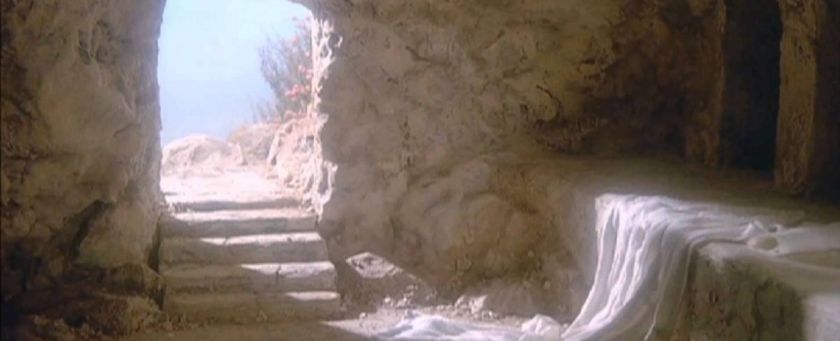The Empty Tomb is a Sign of Hope For Us
Holy Saturday At the Easter Vigil in the Holy Night of Easter, Year B

Readings:
Gn. 1:1, 26-31a; Ex. 14:15-15:1; Is. 55:1-11; Rom. 6:3-11; Mk. 16:1-7
(Audio recorded live, 3 April 2021)
This Easter, the prophet Isaiah reminds us that just as rain and snow come from the heavens to water the earth and bring forth fruit, so too does the Word of God go forth to do the will of the Father, and he will not return empty handed, but rather, he will achieve the end for which he was sent. That end was the reconciliation of the human race and the salvation of souls. We heard of the harmony that came from God’s creation in the Book of Genesis and how men and women are made in the image of God. They were made by God out of love and that love was to carry over to one another. But, by the time of the Exodus, we hear of how that love was darkened by sin, how God’s people were oppressed by an evil ruler and forced into slavery. God saw their plight and sent his prophet Moses to deliver them from their bondage. In a great display of God’s power, the Red Sea was parted such that the Israelites could escape Pharaoh’s army, and as they were pursued, the waters washed the army away. St. Paul uses the imagery of passing through water as a symbol of dying and rising to new life. “We were indeed buried with [Christ] through baptism into death, so that, just as Christ was raised from the dead by the glory of the Father, we too might live in newness of life.” But, of all these readings, which describe the Divine Economy, the history of God’s salvation, the Gospel gives us another sign: An empty tomb.
Our Gospel passage tonight is what many scholars consider to be the original ending of Mark’s Gospel. What is peculiar about this passage is the way in which it abruptly ends. The women enter the tomb to find the place where Jesus was laid to be empty. Mark tells us the women were utterly amazed, and felt intense emotion at what they saw. But, the young man dressed in a white robe, mysteriously tells them why they are there: “You seek Jesus of Nazareth, the crucified. He has been raised; he is not here.” And as Jesus had promised earlier in the Gospel, he will be raised and go before his disciples to Galilee, we now see the fulfillment of this prophecy in the mission that is given to the women: “But go and tell his disciples and Peter, ‘He is going before you to Galilee; there you will see him, as he told you.’” At one and the same time the proof of Jesus’ own prophecy is fulfilled, first by the empty tomb, and second by this message from the young man. The empty tomb, therefore, becomes a sign of hope for the women and the disciples, who will see their beloved Master once again. The abrupt ending of this passage, however, leaves us wondering, did the women actually go and tell the disciples? Did they fulfill the mission they were given by the young man in the tomb? It certainly is an interesting cliffhanger to say the least, but perhaps that is on purpose. What if we were one of those women? What would we have done? Would we have spread the message, “He is Risen!” far and wide? Or would we keep it to ourselves? The lesson of tonight’s Gospel is one that invites us into the tomb, invites us into the death of Christ, only to reveal to us he is risen. This is a message of great hope.
We do well to hold on to this hope ourselves, for the life of the Christian is often beset with trials similar to those of the ancient past. We see this is Jesus’ own rejection, suffering, and death. Yes, today we may have a sophisticated world of digital electronics and the internet, but these alone can save no one. It is our unwavering hope in the promise of Jesus Christ, namely the Parousia, his second coming, and our share in his own resurrection, that draws us to this holy place. The tomb is empty, Christ is risen, and we are called to seek and proclaim him day by day.
Today, as we celebrate the great joy of the empty tomb, the resurrection of Jesus, we also welcome our Elect, those men and women and young people, who will be receiving their sacraments. This has been the Church’s Tradition for nearly two thousand years, and it is with great pride that I may vouch for our Elect and candidates for Confirmation. It should give us all great joy, that on this day of great solemnity, the number of God’s flock will be increased.
And so, as we witness to the Baptism and Confirmation of our Elect, let us also renew our own Baptismal promises, that renewed by the Spirit of Christ, our faith may be deepened, our hope strengthened, and our love overflowing for one another. And may our celebration of the Eucharist draw us ever closer to Christ, our Risen Lord, who delivers us from death and raises us to eternal life.
Given during the COVID-19 pandemic.





Share this post
Twitter
Facebook
Pinterest
Email